| Listing 1 - 8 of 8 |
Sort by
|
Book
Abstract | Keywords | Export | Availability | Bookmark
 Loading...
Loading...Choose an application
- Reference Manager
- EndNote
- RefWorks (Direct export to RefWorks)
Esprit et corps dans la littérature --- Geest en lichaam in de literatuur --- Mind and body in literature --- Body, Human, in literature --- Soul in literature --- Body and soul in literature --- French literature --- Themes, motives --- 19th century --- History and criticism --- Romanticism --- France
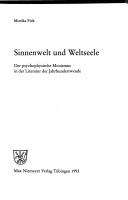
ISBN: 3484181257 3111821307 3110923807 9783484181250 Year: 1993 Volume: 125 Publisher: Tübingen: Niemeyer,
Abstract | Keywords | Export | Availability | Bookmark
 Loading...
Loading...Choose an application
- Reference Manager
- EndNote
- RefWorks (Direct export to RefWorks)
Esprit et corps dans la littérature --- Geest en lichaam in de literatuur --- Mind and body in literature --- German literature --- Monism in literature. --- Metaphysics in literature. --- History and criticism. --- 19th century --- History and criticism --- 20th century --- German literature - 19th century - History and criticism. --- German literature - 20th century - History and criticism. --- Young Germany
Book
ISBN: 9782503527963 2503527965 Year: 2011 Volume: 2 Publisher: Turnhout: Brepols,
Abstract | Keywords | Export | Availability | Bookmark
 Loading...
Loading...Choose an application
- Reference Manager
- EndNote
- RefWorks (Direct export to RefWorks)
Aliénation mentale dans la littérature --- Esprit et corps dans la littérature --- Geest en lichaam in de literatuur --- Gekte in de literatuur --- Insanity in literature --- Krankzinnigheid in de literatuur --- Mental illness in literature --- Mind and body in literature --- Waanzin in de literatuur --- Mind and body --- Europe --- History --- Mental health --- Witchcraft --- Imagination --- Médecine et psychologie --- Hypocondrie --- Histoire
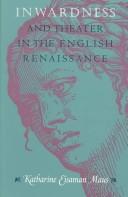
ISBN: 0226511243 Year: 1995 Publisher: Chicago London University of Chicago Press
Abstract | Keywords | Export | Availability | Bookmark
 Loading...
Loading...Choose an application
- Reference Manager
- EndNote
- RefWorks (Direct export to RefWorks)
Apparence (Philosophie) dans la littérature --- Appearance (Philosophy) in literature --- Esprit et corps dans la littérature --- Geest en lichaam in de literatuur --- Intentionaliteit (Filosofie) in de literature --- Intentionality (Philosophy) in literature --- Intentionalité (Philosophie) dans la littérature --- Mind and body in literature --- Realiteit in de literatuur --- Reality in literature --- Réalité dans la littérature --- Schijn (Filosofie) in de literatuur --- Truth in literature --- Vérité dans la littérature --- Waarheid in de literatuur --- Werkelijkheid in de literatuur --- Appearance (Philosophy) in literature. --- English drama --- Intentionality (Philosophy) --- Mind and body in literature. --- Reality in literature. --- Renaissance --- Theater --- Truth in literature. --- History and criticism. --- History --- Intentionality (Philosophy). --- England --- 16th century --- 17th century --- Shakespeare, William --- Philosophy --- Early modern, 1500-1700 --- History and criticism --- English drama - Early modern, 1500-1700 - History and criticism. --- Intentionality (Philosophy) in literature. --- Renaissance - England.
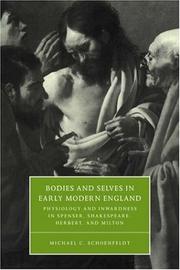
ISBN: 0521669022 0521630738 9780521630733 9780521669023 Year: 1999 Volume: 34 Publisher: New York Cambridge Melbourne Cambridge University Press
Abstract | Keywords | Export | Availability | Bookmark
 Loading...
Loading...Choose an application
- Reference Manager
- EndNote
- RefWorks (Direct export to RefWorks)
Michael Schoenfeldt's fascinating study explores the close relationship between selves and bodies, psychological inwardness and corporeal processes, as they are represented in early modern English literature. After Galen, the predominant medical paradigm of the period envisaged a self governed by humors, literally embodying inner emotion by locating and explaining human passion within a taxonomy of internal organs and fluids. It thus gave a profoundly material emphasis to behavioural phenomena, giving the poets of the period a vital and compelling vocabulary for describing the ways in which selves inhabit and experience bodies. In contrast to much recent work on the body which has emphasized its exuberant 'leakiness' as a principal of social liberation amid oppressive regimes, Schoenfeldt establishes the emancipatory value that the Renaissance frequently located not in moments of festive release, but in the exercise of regulation, temperance and self-control.
Body [Human ] in literature --- Corps humain dans la littérature --- Esprit et corps dans la littérature --- Geest en lichaam in de literatuur --- Human body in literature --- Ik in de literatuur --- Lichaam [Menselijk ] in de literatuur --- Menselijk lichaam in de literatuur --- Mind and body in literature --- Moi dans la littérature --- Psychologie als thema in de literatuur --- Psychologie comme thème dans la littérature --- Psychologie dans la littérature --- Psychologie in de literatuur --- Psychology as a theme in literature --- Psychology in literature --- Self in literature --- Body, Human, in literature. --- English literature --- Human body in literature. --- Mind and body in literature. --- Psychology in literature. --- Renaissance --- Self in literature. --- Psychological aspects. --- History and criticism. --- Shakespeare, William, --- Spenser, Edmund, --- Herbert, George, --- Milton, John, --- Knowledge --- Physiology. --- Soi dans la littérature --- Zelf in de literatuur --- Early modern, 1500-1700 --- History and criticism --- Shakespeare, William --- Physiology --- Spenser, Edmund --- Herbert, George --- Psychological aspects --- England --- Milton, John
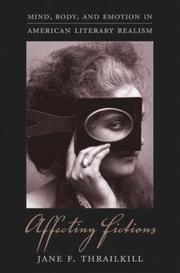
ISBN: 0674025121 9780674025127 Year: 2007 Publisher: Cambridge (Mass.) : Harvard university press,
Abstract | Keywords | Export | Availability | Bookmark
 Loading...
Loading...Choose an application
- Reference Manager
- EndNote
- RefWorks (Direct export to RefWorks)
Body [Human ] in literature --- Corps humain dans la littérature --- Emoties in de literatuur --- Emotions dans la littérature --- Emotions in literature --- Esprit et corps dans la littérature --- Geest en lichaam in de literatuur --- Human body in literature --- Lichaam [Menselijk ] in de literatuur --- Littérature réaliste --- Menselijk lichaam in de literatuur --- Mind and body in literature --- Neorealism (Literature) --- Neorealisme (Literatuur) --- Néoréalisme (Littérature) --- Realism (Literary movement) --- Realism in literature --- Realisme (Letterkundige beweging) --- Realisme (Literaire beweging) --- Realisme in de literatuur --- Realistische literatuur --- Réalisme (Mouvement littéraire) --- Réalisme dans la littérature --- American fiction --- Emotions in literature. --- Human body in literature. --- Mind and body in literature. --- Realism in literature. --- History and criticism --- Theory, etc. --- United States --- Intellectual life --- 19th century --- 20th century
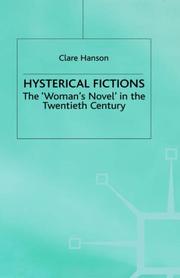
ISBN: 0333638891 Year: 2000 Publisher: Houndmills London Macmillan
Abstract | Keywords | Export | Availability | Bookmark
 Loading...
Loading...Choose an application
- Reference Manager
- EndNote
- RefWorks (Direct export to RefWorks)
820-31 "19" --- 820-31 "19" Engelse literatuur: novel roman--20e eeuw. Periode 1900-1999 --- Engelse literatuur: novel roman--20e eeuw. Periode 1900-1999 --- Body [Human ] in literature --- Corps humain dans la littérature --- Esprit et corps dans la littérature --- Geest en lichaam in de literatuur --- Lichaam [Menselijk ] in de literatuur --- Menselijk lichaam in de literatuur --- Mind and body in literature --- 820-31 "19" Engelse literatuur: novel; roman--20e eeuw. Periode 1900-1999 --- Engelse literatuur: novel; roman--20e eeuw. Periode 1900-1999 --- English fiction --- Women authors --- History and criticism --- Feminism and literature --- Great Britain --- History --- 20th century --- Women and literature --- Feminist fiction [English ] --- Women --- Books and reading --- Femininity in literature --- Women in literature --- Feminist fiction, English - History and criticism. --- Human body in literature
Book
ISBN: 9781107007918 9780511812071 9781107694149 9781139078818 113907881X 1107007917 0511812078 1139064053 110722182X 1283112841 9786613112842 1139076531 113908335X 113908108X 1139070819 1107694140 Year: 2011 Publisher: Cambridge, U.K. ; New York : Cambridge University Press,
Abstract | Keywords | Export | Availability | Bookmark
 Loading...
Loading...Choose an application
- Reference Manager
- EndNote
- RefWorks (Direct export to RefWorks)
"For much of the nineteenth century, the nervous system was a medical mystery, inspiring scientific studies and exciting great public interest. Because of this widespread fascination, the nerves came to explain the means by which mind and body related to each other. By the 1830s, the nervous system helped Americans express the consequences on the body, and for society, of major historical changes. Literary writers, including Nathaniel Hawthorne and Harriet Beecher Stowe, used the nerves as a metaphor to re-imagine the role of the self amidst political, social and religious tumults, including debates about slavery and the revivals of the Second Great Awakening. Representing the 'romance' of the nervous system and its cultural impact thoughtfully and, at times, critically, the fictional experiments of this century helped construct and explore a neurological vision of the body and mind. Murison explains the impact of neurological medicine on nineteenth-century literature and culture"--
Angoisse dans la littérature --- Angst in de literatuur --- Esprit et corps dans la littérature --- Geest en lichaam in de literatuur --- Ik in de literatuur --- Mind and body in literature --- Moi dans la littérature --- Physiology in literature --- American literature --- 19th century --- History and criticism --- Literature and science --- United States --- History --- Nervous system --- Psychological aspects --- Anxiety in literature --- Neurosciences --- Self in literature --- Bird, Robert Montgomery --- Poe, Edgar Allan --- Criticism and interpretation --- Stowe, Harriet Elizabeth Beecher --- Hawthorne, Nathaniel --- Hall, Marshall --- Lippard, George --- Phelps, Elizabeth Stuart --- Anxiety in literature. --- Mind and body in literature. --- Self in literature. --- Physiology in literature. --- Neural sciences --- Neurological sciences --- Neuroscience --- Medical sciences --- Organs (Anatomy) --- Poetry and science --- Science and literature --- Science and poetry --- Science and the humanities --- History and criticism. --- Psychological aspects. --- Arts and Humanities --- Literature
| Listing 1 - 8 of 8 |
Sort by
|

 Search
Search Feedback
Feedback About UniCat
About UniCat  Help
Help News
News